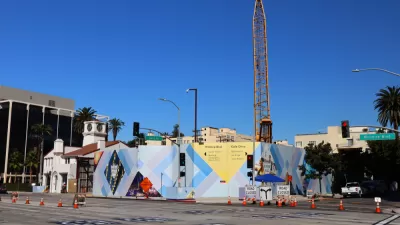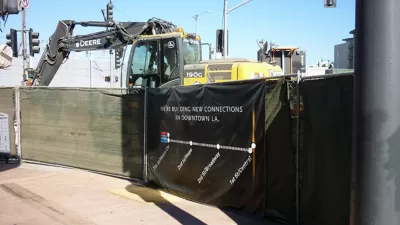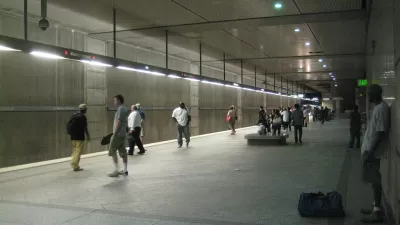Taras Grescoe examines how public transportation in the United States is gaining popularity and riders, but still lags in funding.
Taras Grescoe hears all sorts of opinions when it comes to public versus private transportation. Some see subways as cars for plebeians or "greener-than-thou zealots." Others see car commuters as selfish and "society-phobic individualists." The consistent fact he does find is the trend that people aren't using cars as much, especially younger drivers. In fact, "almost half of those aged 16 to 24 say they would choose Internet access over car ownership." Whether it's due to expensive gas or unbearably congested traffic, "across North America, transit ridership is skyrocketing."
While public transportation is becoming more popular, it's not going phase out cars any time soon. Even city residents who commute daily by subway still use cars for longer trips and for carrying big loads. In addition, federal funding favors roads and car networks to public transit systems. Grescoe notes that, "freeways...received $52 billion in federal funding in 2010, while Amtrak, in spite of record ridership, limped along with $1.5 billion in subsidies."
Ultimately, Grescoe finds that all types of transportation are useful. "[E]very subway-rider hails a taxi now and then, and even hardcore motorists find themselves longing for a bike ride in a park or a stroll on a plaza. In the city, everybody goes multi-modal."
FULL STORY: Return of the Straphanger Nation

Alabama: Trump Terminates Settlements for Black Communities Harmed By Raw Sewage
Trump deemed the landmark civil rights agreement “illegal DEI and environmental justice policy.”

Study: Maui’s Plan to Convert Vacation Rentals to Long-Term Housing Could Cause Nearly $1 Billion Economic Loss
The plan would reduce visitor accommodation by 25% resulting in 1,900 jobs lost.

Why Should We Subsidize Public Transportation?
Many public transit agencies face financial stress due to rising costs, declining fare revenue, and declining subsidies. Transit advocates must provide a strong business case for increasing public transit funding.

Wind Energy on the Rise Despite Federal Policy Reversal
The Trump administration is revoking federal support for renewable energy, but demand for new projects continues unabated.

Passengers Flock to Caltrain After Electrification
The new electric trains are running faster and more reliably, leading to strong ridership growth on the Bay Area rail system.

Texas Churches Rally Behind ‘Yes in God’s Back Yard’ Legislation
Religious leaders want the state to reduce zoning regulations to streamline leasing church-owned land to housing developers.
Urban Design for Planners 1: Software Tools
This six-course series explores essential urban design concepts using open source software and equips planners with the tools they need to participate fully in the urban design process.
Planning for Universal Design
Learn the tools for implementing Universal Design in planning regulations.
Caltrans
Smith Gee Studio
Institute for Housing and Urban Development Studies (IHS)
City of Grandview
Harvard GSD Executive Education
Toledo-Lucas County Plan Commissions
Salt Lake City
NYU Wagner Graduate School of Public Service





























